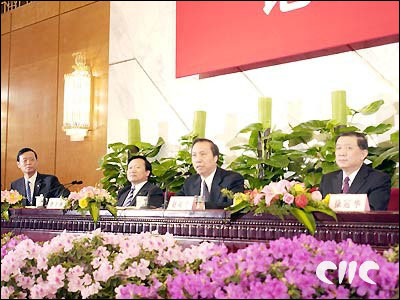| Home / China / National News | Tools: Save | Print | E-mail | Most Read |
| Nation Confident on 2020 Innovation Target |
| Adjust font size: |
China is confident that it will become an "innovative country" by 2020 despite arduous tasks ahead, Minister of Science and Technology Xu Guanhua said on Friday.
In 2001, China ranked 28th among 49 major countries in terms of comprehensive scientific and technological innovation capability. "We must enter the top 20 before we can say that we have realized our target," Xu told a news briefing on building an innovation-oriented country on the sidelines of the ongoing session of the National People's Congress. "Our per capita supply of energy, water and land resources is becoming more stringent as we face pressing problems in resources and environment," Xu said. Only by promoting science and technology can China solve these problems, he noted. According to Xu, Chinese enterprises are under increasing pressure from international competitors in globalization. They have to pay high patent fees, for example, 20 percent of a mobile phone's price, 30 percent of a computer's and 40 percent of the price of a program-controlled digital machine tool, to foreign patents owners. To change the situation, the budget for science and technology this year will reach 71.6 billion yuan (US$8.9 billion), up 19.2 percent year-on-year, according to Zhang Shaochun, assistant minister of finance. He said the government will ensure that expenditures on research and development (R&D) grow at a faster pace than fiscal revenues in the next five years. The government will also offer tax incentives to innovative businesses, he said. The new tax policies will allow an enterprise to use 150 percent of its spending on R&D to offset payable income tax of that year. "In other words, the government will give tax rewards to companies that are actively involved in R&D," said Fang Hanting, a senior researcher with the National Research Center for Science and Technology Development. Fang said the tax allowance will help reduce the financial risk of research-oriented companies and catalyze the emergence of more innovative firms. Besides, the new policy encourages companies to accelerate depreciation of research-related facilities. Zheng Chaocai, a tax official in Xiamen, Fujian Province, said the policy gives companies more tax preference. He called it a breakthrough in the country's tax policy. Beijing Vimicro Corporation said it is expected to double its sales income with the help of the tax incentives. At the end of last month, the government released a 58-point package of policies to help carry out its medium and long-term science and technology development program. One of the highlights is to allow China Development Bank to issue loans with low interests to high-tech companies as an investor, Fang said. The bank has already started 50 such projects by investing 5 billion yuan (US$625 million) altogether. During the press briefing on Friday, Zhang Xiaoqiang, vice-minister of the National Development and Reform Commission, unveiled China's plans to build many major technological infrastructure projects in the next five years. (China Daily March 11, 2006) |
| Tools: Save | Print | E-mail | Most Read |
 |
| Related Stories |
